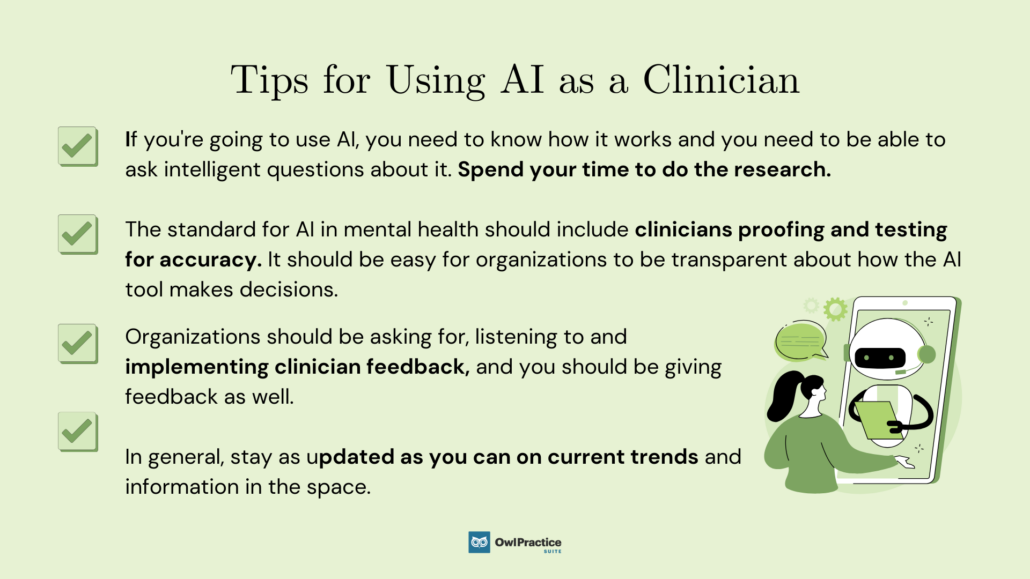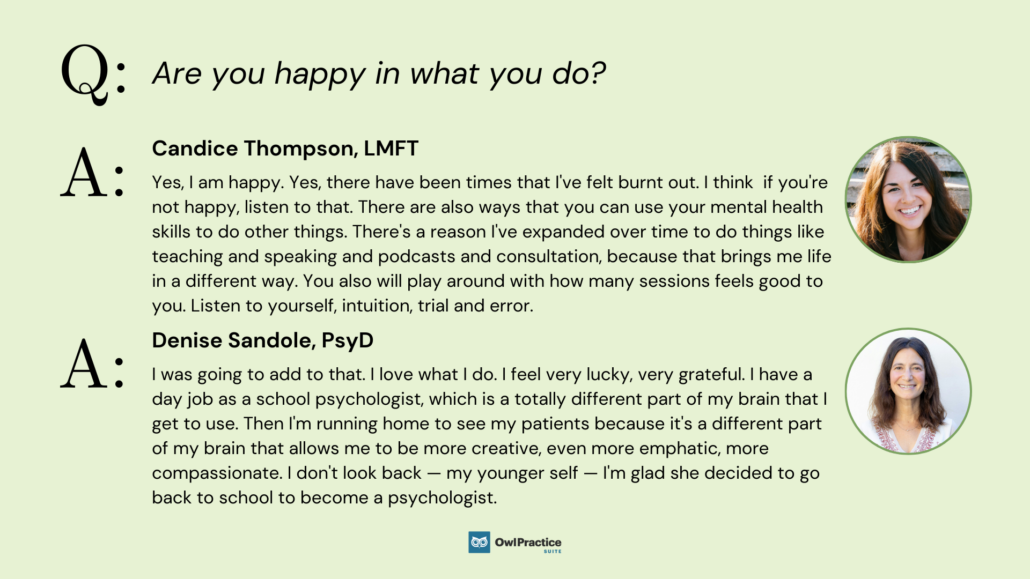
Webinar Attendee Submitted Questions, and General Q&A
Megan: Before we started, we had people submit questions and then people have also asked 28 other questions. We won’t be able to get through all of them, but we are certainly going to try to get through a lot of them. One of the first questions that I’m just going to take, someone asked, before starting, what are your thoughts on AI being used in EHRs, and I know that AI is a very hot topic. I’ve gotten the chance to work with a few companies and spend a lot of time working with and interviewing and creating content for PhD researchers in the AI space, so I’m just going to put some things out there. I think that if you’re going to use AI, you need to know how it works and you need to be able to ask intelligent questions about it. Spend your time to do the research.
A lot of these companies are just ChatGPT dressed up, and I personally think that there needs to be a higher standard for AI used in mental health. I think that the companies that are doing mental health-specific databases to train their models—they’re having clinicians do the proof, doing a random test to prove that it’s accurate, all of those things. Have a high standard for AI. Demand transparency and ask how it makes decisions. If they can’t answer that question, then that means that they’re just giving it to ChatGPT.
You need to be giving lots of feedback to these companies who sometimes do not have clinicians. If you’re going to work with a company, make sure that they both ask, listen to, and I guess three things, respond and make changes based on clinician feedback.
Things are changing constantly. This advice will probably be outdated in a few weeks, but just stay updated. I try and share information as I learn about AI on my LinkedIn, and there are some excellent experts out there also sharing information about this.

Another question we had was about navigating Medicare and Medicaid because it’s different. Sarah, could you talk a little bit about that?
Sarah: Yes, I actually just recently started accepting Medicaid, and in Colorado, that means you also are paneled with Medicare. I actually don’t find it that different from working with other insurance companies. I was trained in nonprofit, so the way I was trained, especially around documentation, was specific to Medicaid, which is considered the gold standard for documentation. I would definitely make sure that you’re brushed up on all the documentation requirements for accepting insurance, and you’ll be good to go.
Megan: Thanks. We’ve got a couple of questions about paneling for insurance. People wanting to know, how do you decide which and how many insurance panels, and just what is the process of going about that?
Sarah: Yes, I think for me, it’s been worthwhile to know, asking colleagues a little bit, generally, what the rates are that they’re getting from each panel, that matters. The other one is, when you’re getting clients that are asking, do you take insurance, listening, what insurance do you have? Because I find in certain areas, a lot of people might have the same insurance type or things like that. Those are things that I was looking for.
Megan: Awesome. Someone is asking about progress notes, taking care of that in a timely manner and writing notes in between client appointments. Candice, I’m guessing you could take care of that one, as well as maybe talking a little bit about if you use tools and how you decide what tools to use for that process.Then, anyone else.
Candice: I’m old school, so I literally have a yellow legal pad on my desk, and I keep paper files still. That has been the easiest thing for me because I can do some of those notes in real time. I don’t want to have my face in the paper, but it’s an easy way to have some of the initial information. Then right after they leave, I can finish that really quickly, keep it in their file, and put it in a locked file cabinet.
However, I do have an associate, so I’ve done research around SimplePractice and all of the other online resources. I will say what I have found from the different ones I’ve trialed and error, and one I tried and ended up getting my money back for because they lost the data. Which, again, some of this tech is still so new. Going back to that generative AI conversation, when we put in a question to Google, it literally says, this is an experimental answer. Yes, all of this is still so new in the forefront.
I’ll say SimplePractice is really expensive, so I chose not to do that. However, Care Patron is something that I do use for my associate, and that is extremely affordable, has a great UI, and they have a free credit card processing option, which is wonderful.
Megan: Denise, Macy, Sarah, just real quick, any tools that you’ve used for documentation that you would recommend?
Macy: Yes, I’ll go really fast. I actually did some trial and error with different EHRs. A lot of them actually give you free trial periods. I tried a few of them out and then found the one that I liked, the layout of the notes and the treatment plans and the calendar, and made sure it had calendar syncing so that everything could be in one place, which is much more time efficient.
I am actually able to do all my notes in between my sessions, so I’m not stuck at the end of the day writing notes for an hour because I did my due diligence and found the one that I had the easiest time working with.
Denise: I can add, I guess I’m old school like Candice, and again, I only have the five to seven patients per week, so I do all my progress notes by hand, but I’m typing them in my very secure Microsoft Word files. If you do go that route, just make sure you opt in for the password-protected Microsoft Word files and then keep all those files in a password-protected folder on your device.
I’ll also share a technique that a really helpful internship supervisor shared with me. This is back in 2010. I think at the time I was working at a New York City public hospital. I had about 80 patients, revolving door style. It was all day, constant, with the, you had to have like seven to eight stats per day, and I came to him and I said, “I don’t know how I’m going to get all these notes done. There is no time slotted in this revolving door of 80 patients per week.”
He was a proponent of solution-focused therapy, brief psychodynamic therapy, and he said, “You have to make the note a part of your session.” I got into the practice of, you carve out, we’ll say two to five minutes at the end of your session, and it actually can be really helpful. You and your patient end up walking away with similar takeaways, meaning I know what I got out of this session, but maybe it wasn’t the same as you, and you get to discuss that.
It’s also really good for memory retrieval when you’re trying to remember the following week, what did we talk about? You have those 80 patients revolving. I don’t have to use that technique now, but if that’s something that might be helpful, feel free to always apply that. It really did make a big difference.
Megan: Thank you. Sarah, I know that you use Owl Practice, since they so generously sponsored this conversation. Just quickly, could you talk about your experience using them as an EHR?
Sarah: Yes, so I use Owl Practice, and it’s been great. They have templates available for notes, for initial assessments and follow-ups, so that you can pull in the required information for those things. Yes, definitely go into an EHR. I did when I started taking insurance and also growing a group practice, so it’s just a little bit easier for that. If you’re on your own, paper documentation is fine.
Owl and many others have some really great templates for notes, and you can also, believe it or not, copy-paste forward your previous note and make adjustments as needed. There’s a lot of really great tools in an EHR, if you’re worried about documentation.
Megan: Thanks so much. There’s another question here that I wanted to address. Someone mentioned that some of these companies have negotiated higher rates. I heard this platform often gets therapists higher rates than pursuing rates directly with the insurance company. That is both true and false, and here’s why.
A few years ago, when these companies were getting started and all the parity laws were pressuring the insurance networks about their ghost networks and all that stuff, insurance companies were all about these companies, because they would help with accessibility. They were offering higher rates because they could, by offering higher rates to this one company, increase their network exponentially for their customers, their patients, to access.
However, and this is my unprofessional opinion from the rumors I’ve heard from executives at these companies, it seems like insurance companies are now regretting the fact that when people have access to mental health care, they are going to access mental health care, and therefore insurers are going to pay. Companies are now seeing rate cuts from payers.
What I would say: use these companies if they’re helpful for you, but don’t depend on them to be helpful forever. There might be times you come in and out. Always just be prepared to have your private practice as a backup, and know what your options are for that.
Someone had a question about liability, corporate professional liability. How do you guys handle liability and just insurance regarding all that?
Candice: I can jump in, and certainly, so I have a professional liability company that I use. Someone shared with me that you should always max out those liabilities, just in case. Therapists don’t get sued as much as other companies, so those liability insurances are more affordable than if you were like a surgeon, because it’s not likely that someone will die in our office, but it’s really important to have.
Then if you have a business, the business insurance is also something to consider that covers your business entities separate from your professional liability, which most professional liabilities cover some of, but it’s not as extensive as a business liability.
For my associate, for example, my professional liability does not cover her. My business liability insurance covers the locations that I use and my associate and myself. All that’s trial and error too. To get that insurance, I spent hours and talked to like six different companies and was declined from a lot because I have multi sites. A lot of this is, on the front end, it takes a lot of work, but then you never have to do that part again. If it feels challenging, that’s normal. Then you’re done with that task.
Sarah: Yes, I was going to say, don’t be afraid to shop around just like you would for your car. Make some phone calls.
Megan: I’ve got a couple of questions about Macy, where you found your consultation group, how you got connected with that. One person wants to know who you use for EHR.
Macy: Yes, so I actually found my consultation group through some of the Facebook groups I’m in. I’ve found quite a few therapists just in my area that also do only telehealth services. What they did is they created this group and then they posted in all these Facebook groups, asking people if they wanted to be a part of it. If you did, they put you on an email list.
Yes, so really just two therapists organized the whole thing and just networked a little bit. I got on that list. Now I have a group I meet with once a month and it’s really great. There’s a lot of people in it, but what they do is they put you into little breakout rooms. You’re really just doing these consultations with four or five people. That’s how I found it. Can you repeat the second question?
Megan: Someone just wanted to know what EHR you use.
Macy: Yes, so I ended up picking Sessions Health because I found it’s really affordable. It’s super simple. They haven’t raised their rates. I know some EHRs have been raising their rates recently. I really liked that. I think I ended up trying four different EHRs and Sessions Health was the one I went with.
Megan: Random question, are you all happy in what you do? This person is just a newbie trying to decide what they want to do, deciding if they want to pursue a degree in counseling or go academic and do research and that stuff, so.

Candice: I can start on that. Yes, I am happy. Yes, there have been times that I’ve felt burnt out. I think, A, if you’re not happy, listen to that. There are also ways that you can use your mental health skills to do other things. Like Megan is doing, I did some writing and consultations and things like that.
You don’t have to do therapy if it’s uncomfortable to you. There’s a reason I’ve expanded over time to do things like teaching and speaking and podcasts and consultation, because that brings me life in a different way. You also will play around with how many sessions feels good to you. I remember when I was starting out, I worked 40 hours a week and that totally burned me out. Now I work about 20 clinical hours.
Listen to yourself, intuition, trial and error.
Denise: I was going to add to that. I love what I do. I feel very lucky, very grateful. I have a day job as a school psychologist, which is a totally different part of my brain that I get to use. Then I’m running home to see my patients because it’s a different part of my brain that allows me to be more creative, even more emphatic, more compassionate.
Yes, I don’t know if it’s because I have that balance, you know, how we’re always, by our human nature, skewing toward the grass is always greener. I feel very fortunate that I have that balance in my career. Like Candice said, you’ll find out where that line is for yourself.
I don’t know how I would feel if I was doing private practice full time. I imagine it down the road, sort of like a retirement plan or something. I think I would still love it then, too. If I didn’t, then you expand and you branch out and you find your own sweet spot of where you are balancing it with other things, because you do want to still love this job, right?
I don’t look back — my younger self — I’m glad she decided to go back to school to become a psychologist.
Read more about the panelists and where to follow them here: Power to the Private Practice: Finding Your Best Path to Private Practice.
Read all previous parts below:
- Part 1: What are three things you wish you could tell yourself in the year before you started your private practice?
- Part 2: Let’s talk about insurance vs. private pay — how did you decide, and what tools or information helped you make that decision?
- Part 3: How did you decide between using platforms like Alma and Headway vs. going completely independent? What are the trade-offs?
- Part 4: How do you…pay taxes? Do market research? Brand yourself? Stay on top of bookkeeping?
- Part 5: How do you continue to stay informed and have a support network to help answer questions and navigate private practice after you are up and running?

Start a Free Trial!
Reduce clinical administrative tasks and transform more lives with Owl Practice. Owl Practice provides all the tools you need to make your practice successful. Join the thousands of care professionals using Owl to run their practice every day.



